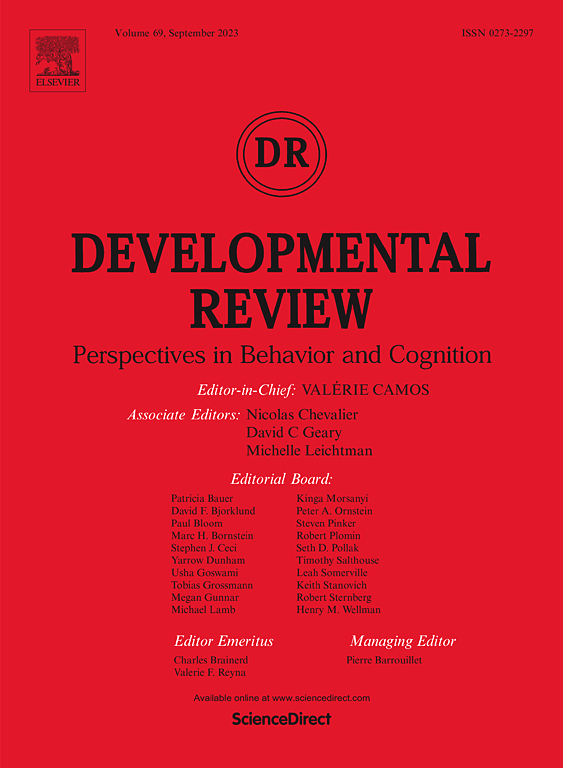Learning to live in the spatial world: Experience-expectant and experience-dependent input
IF 5.6
1区 心理学
Q1 PSYCHOLOGY, DEVELOPMENTAL
引用次数: 0
Abstract
The core challenge in the study of cognitive development is to specify what infants bring to the task of learning, and how inborn biological processes interact with environmental input to propel change, often extending through childhood and adolescence. Ideally, we would delineate not only the typical developmental trajectory for important lines of development, but also the drivers of that trajectory, and how variation in those drivers leads to variation across children, families, communities, and cultures, and differences among adults in their patterns of skills. One of the chief challenges to achieving these goals is the difficulty of specifying relevant environmental input. This article considers how to assess input in spatial development, including for object-centered spatial skills, navigation, and learning fundamental geometric concepts, such as shape and angle. There is good evi that both experience-expectant and experience-dependent input matters, but a detailed and specific account of these processes is a task for the future.
学会在空间世界中生活:经验预期输入和经验依赖输入
认知发展研究的核心挑战是明确婴儿学习任务的内容,以及先天的生物过程如何与环境输入相互作用,从而推动变化,这种变化往往会延续到童年和青春期。理想的情况是,我们不仅要勾勒出重要发展方向的典型发展轨迹,还要勾勒出这一轨迹的驱动因素,以及这些驱动因素的变化如何导致儿童、家庭、社区和文化之间的差异,以及成年人在技能模式上的差异。实现这些目标的主要挑战之一是难以确定相关的环境投入。本文探讨了如何评估空间发展中的输入,包括以物体为中心的空间技能、导航和基本几何概念(如形状和角度)的学习。有证据表明,经验预期输入和经验依赖输入都很重要,但对这些过程进行详细而具体的描述是未来的任务。
本文章由计算机程序翻译,如有差异,请以英文原文为准。
求助全文
约1分钟内获得全文
求助全文
来源期刊

Developmental Review
PSYCHOLOGY, DEVELOPMENTAL-
CiteScore
11.00
自引率
3.00%
发文量
27
审稿时长
51 days
期刊介绍:
Presenting research that bears on important conceptual issues in developmental psychology, Developmental Review: Perspectives in Behavior and Cognition provides child and developmental, child clinical, and educational psychologists with authoritative articles that reflect current thinking and cover significant scientific developments. The journal emphasizes human developmental processes and gives particular attention to issues relevant to child developmental psychology. The research concerns issues with important implications for the fields of pediatrics, psychiatry, and education, and increases the understanding of socialization processes.
 求助内容:
求助内容: 应助结果提醒方式:
应助结果提醒方式:


